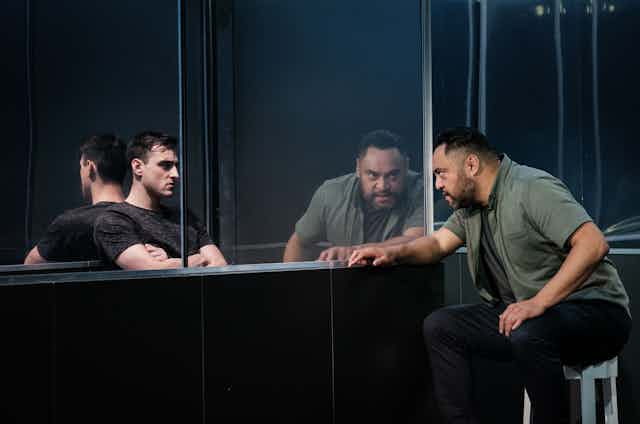Review: Jailbaby, directed by Andrea James, Griffin Theatre Company
Jailbaby – a new play by Suzie Miller – takes a steely look at what happens to an 18-year-old when his life collides with a criminal justice system that is bad and getting worse.
Jailbaby follows the phenomenal success of Prima Facie, which scrutinised the law’s failure to protect female victims of sexual assault. Following its premiere at Sydney’s Griffin Theatre Company in 2019, Prima Facie had seasons in London and New York, winning best new play at the United Kingdom’s Olivier Awards.
A one-time lawyer with the Aboriginal Legal Service and Shopfront Youth Legal Centre, Miller’s plays venture into dark places few want to confront.
This new play focuses on jail rape, a crime that is understudied, under scrutinised and underreported. It takes place in an environment where seeking help or speaking up has the opposite of the intended effect.
Read more: In Suzie Miller's Prima Facie, theatre finds a voice of reckoning on sexual assault and the law
A life of struggle
AJ is a wide-eyed teenager (compellingly played by Anthony Yangoyan). His mother (Lucia Mastrantone) is a recovering drug addict. His violent father disappeared long ago. They live in social housing. They struggle.
AJ has a long record of troubled behaviour, mostly property crimes, which has seen him spend time in juvenile detention. At 18, AJ is highly impressionable – even gullible – and under the thumb of some older, nastier criminals.
When he needs $500 to go on a soccer trip he thinks will transform his life, he chooses the wrong way to get it.
He imagines the “massive smart TV, MacBooks, iPad” he will stuff into a blue IKEA bag “like a Christmas stocking.”
“Ka-ching!” he thinks.
Of course, it doesn’t turn out like that.

Imagined sacred space
The courtroom of the public imagination is like the last sacred space in a secular society.
It is presided over by judges beyond the reach of criticism. People readily imagine a defendant’s case will be carefully considered; that everybody has a lawyer in a sharp suit who will make eloquent pleas and ask searching questions.
In reality, the lower courts are crowded and chaotic. A duty solicitor quoted in recent research paper likened the civil courts to a “zoo”. The criminal courts are worse.
Miller’s play rips right through this veil of illusion.
Despite his age, AJ fails to get bail. He is tried remotely via prison video link. The court appears as a tiny square on a computer screen.

AJ’s lawyer (Mastrantone) tries. But she is already disassociating herself from what she knows will happen. Perhaps this is just the way that lawyers cope.
AJ still thinks, by some miracle, he’ll get off with a warning. His mind is on his upcoming football training session. He doesn’t think the court will take away his big chance to change his life. But, of course, they do.
And in jail, AJ loses everything.
Incarceration in Australia
The back cover of the published script says the play pinpoints “the exact moment when it all goes so, so wrong” for AJ.
But that moment happened long before he took the jersey or the iPhone. It happened long before AJ was born, when politicians decided locking up more – and younger – people made them popular.
Even as the rate of offending in Australia has dropped, the prison rate has steadily climbed.
Read more: Australia's prison rates are up but crime is down. What's going on?
Australia incarcerates a greater percentage of its population than China, Guatemala or the United Kingdom. The United States leads the world in per capita incarceration, but Australia has more people incarcerated who have not been tried or sentenced.
Children as young as ten are incarcerated in some Australian jurisdictions.
Aboriginal and Torres Strait Islander people are the most incarcerated people in the world.
Australian jails are brutalising. They ought to be a measure of last resort. But young people can be sent to jail simply because there are few diversionary programs in regional, remote or rural areas, or because rehabilitation programs may be full.
And it happens in the dark, because newspapers seldom cover the lower courts, unless a celebrity is on trial.
Lower court judgements are rarely published. On busy days, if you blink, you will miss it.
Some lawyers argue this protects the “privacy” of the accused. But when an 18-year-old like AJ is sent to adult jail, that kid has a lot more than “privacy” to worry about.
Read more: The social determinants of justice: 8 factors that increase your risk of imprisonment
Ominous inevitability
Jailbaby is a high impact theatrical work. It contains graphic descriptions of sexual assault by straight men against younger male prisoners. The level of detail written into these descriptions is risky, but this raw brutality is the play’s strength.
Like a lawyer explaining legal proceedings to a client in the courtroom, Miller tells the audience what is likely to happen to AJ at every stage. This foreknowledge is horrifying, because it makes the audience complicit in the action as it unfolds.

Yet, ultimately it doesn’t quite come together. One of the story strands is underdeveloped, and the middle-class characters (whose home AJ burgles) often feel like uncomfortable caricatures.
There are 14 roles shared between three actors, and perhaps this requires a level of dexterity that contributes to uneven performances.
An ominous inevitability ties the best parts of the play together. We are left with a gut-wrenching sense that, for kids like AJ, the justice system has nothing to do with justice.
Jailbaby is at Griffin Theatre Company, Sydney, until August 19.
The National Sexual Assault, Family and Domestic Violence Counselling Line – 1800 RESPECT (1800 737 732) – is available 24 hours a day, seven days a week for any Australian who has experienced, or is at risk of, family and domestic violence and/or sexual assault.

